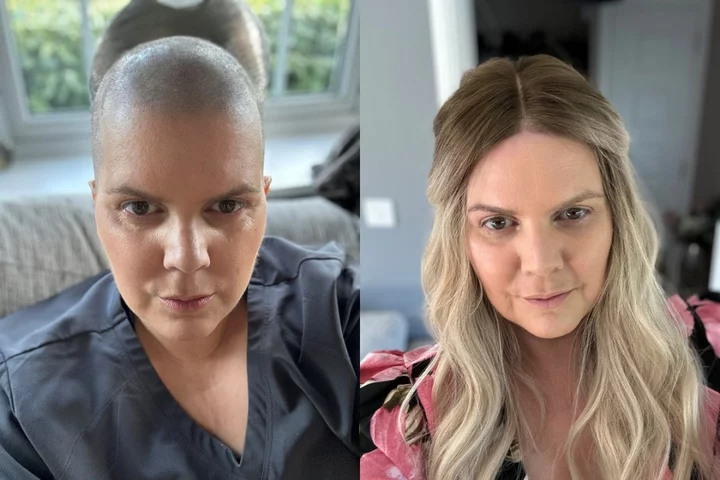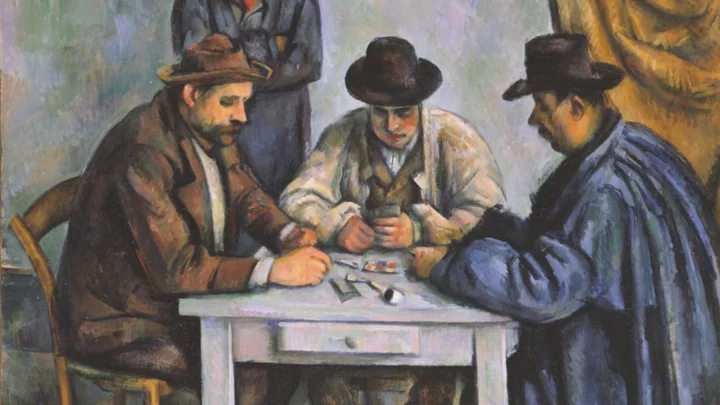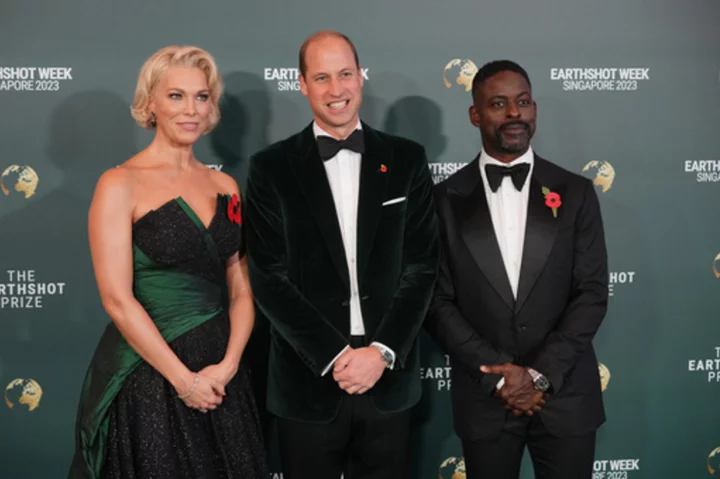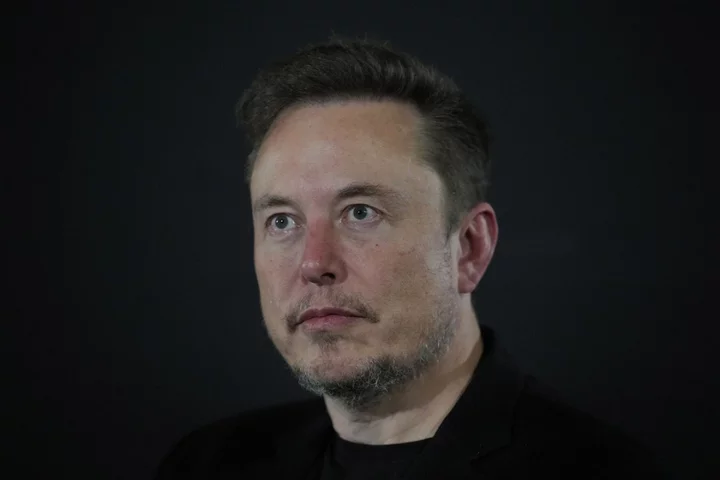
Peru Wants to Make Wines as Iconic as Its Top-Class Restaurants
It took Fernando Gonzales-Lattini four years of failed harvests to be able to make wine at 9,350 feet
2023-11-08 18:27

Salon owner with incurable cancer who lost hair during treatment makes customisable wigs to help others feel ‘confident’
A salon owner with incurable cervical cancer who lost her hair while having chemotherapy has said wearing wigs has given her “reassurance in a world where nothing is certain”, and she now sells handmade, customisable bespoke wigs to help others feel “confident” in their own skin. Amanda Humphrey, 43, who owns Saramanda1 hair salon in Great Denham, Bedfordshire, was diagnosed with cervical cancer in October 2017 after delaying her smear test by seven years. She underwent a radical hysterectomy in December that year – a surgical procedure to remove the womb and surrounding tissues – and was in remission weeks later. The cancer returned and Humphrey received her second cervical cancer diagnosis just two days before Christmas in 2021, and she then started chemotherapy and radiotherapy. She described this as “hell on Earth”, and within two weeks of starting chemotherapy the second time, she noticed her hair was being “blown out of [her] head” by the wind. Humphrey shaved her head and embraced her baldness but soon realised she missed having “that comfort blanket” – and she then searched “high and low” for a realistic, non-synthetic wig. Through her own searches, which were often fruitless, she realised that the number of people selling customisable wigs made of human hair in her area were few and far between. This led to Humphrey making and selling her own – and now, despite her uncertain prognosis, she said her mission is helping people struggling with hair loss feel like themselves again. “My message is I get it, and that’s why I love the wigs that we produce,” Humphrey told PA Real Life. “I’m proud of the wigs that we produce, and I’m so grateful that people choose us to be a part of their journey. “Every wig is made with love and strength, they are made from the heart, and me and my entire team, we all want them to be just perfect.” Cervical cancer is a cancer that is found anywhere in the cervix – the opening between the vagina and the womb. Symptoms include unusual vaginal bleeding, changes to vaginal discharge, pain during sex or pain in your lower back, the NHS says. Humphrey, who was working as a detective in London at the time and had only just opened her salon, said she had no symptoms prior to her diagnosis and “always found an excuse to cancel [her] smear test”. It was only when a colleague strongly encouraged her to book her smear test, seven years after she was first invited to have one, that she received her diagnosis in October 2017. She said she holds herself responsible for this and has since campaigned for other women to book their smear tests without delay by sharing the message “Don’t be me”. Speaking about her first diagnosis, she said: “I walked into the room and I looked at the consultant and, before I’d even sat down, I said ‘Have I got cancer?’ And he said ‘Yes’. “Then I said ‘Am I going to die?’ And he said, ‘I need to examine you and then I can tell you.’” Humphrey explained that telling her son, who she wishes to keep anonymous, was the hardest part, and she later underwent a radical hysterectomy, which was performed via keyhole surgery. A biopsy revealed she was in remission just weeks later, and while this was positive news she felt “lost” afterwards. She did not process the “trauma” of the cancer and the fact she could no longer get pregnant due to the radical hysterectomy until much later. “Emotionally I struggled because although I didn’t necessarily want more children, I wasn’t ready to to lose that option,” Humphrey explained. “I grieved not having more children, I grieved something I didn’t have, and I never sought help on that, ever. “Given it’s a gynaecological cancer as well, when I visit my local hospital for any appointment, I sit in a room with pregnant people waiting for their appointments. “They come out of their appointments happy, with their files and scan photos, and you’re sitting there, thinking ‘I can’t have that any more’.” In the years that followed, after Humphrey was medically retired from the police, she continued with cervical cancer awareness campaigns and focused on her salon. However, she started to experience agonising pain in her left leg in 2021 and could not pinpoint the exact source of it. After undergoing scans and tests, she was diagnosed with cervical cancer recurrence just two days before Christmas that year. She then underwent chemotherapy and radiotherapy, which caused her to experience sickness, muscle aches, nose bleeds and ulcers in her mouth. During her second round of chemotherapy she lost her hair within two weeks. “I remember saying to one of the nurses ‘The next time I see you in three weeks, will I have hair?’ And she just said ‘No’, and it was true,” Humphrey said. “I was stood outside my salon on week two and it was really windy and I was trying to make a phone call outside. “I said to my colleague ‘My hair is being blown out of my head’ – it was literally just floating past us – so we shaved it off.” Humphrey said she embraced being “bald and proud” initially, but she missed the “comfort” that having hair gave her – and so her journey to creating her own human hair wigs began. Each wig starts from approximately £450, depending on the length and thickness, and can take up to three weeks to make as Humphrey and her team at the salon custom-colour each one. Humphrey said she will often “work into the night” to finish an order, if required, and some customers have even cried when seeing the finished product. She has since partnered with Jo’s Cervical Cancer Trust as well, and for every wig sold through the charity she will donate 10 per cent of the proceeds to the organisation. She explained: “Wearing wigs has given me so much reassurance in a world where nothing is certain. “Just having a wig on gives me that comfort and ability to just be normal, and I want to help others achieve that feeling.” In October 2022, Humphrey was informed her cancer is incurable and she will most likely not reach remission again – however she is determined to keep fighting. She is now having pembrolizumab – a type of immunotherapy – and has regular check-ups, and although she was told that statistically she may only have 18 months to live, she said she wants to “prove everyone wrong, even if (she dies) trying”, and she will not stop her “passion” of making wigs for others. “The results we get are amazing, they’re happy, and being able to support someone with part of their journey is so rewarding – it’s always something I’ve wanted to do,” she said. “It helps them feel confident, and the comfort comes in, but it’s just the fact they can walk out their front door feeling normal.” She added: “If my journey can help someone in the future, then I’m all in.” To find out more about Humphrey and the wigs she and her team make, search @saramanda1_wigs on Instagram. For more information and support about cervical cancer, visit Jo’s Cervical Cancer Trust’s website here. Read More Witch achieves ‘heightened sense of fulfilment’ after self-marriage ceremony If being without your phone fills you with dread, you could have nomophobia Nursery places and wraparound childcare plans announced Is scalp exfoliation the key to healthier hair? Why do some people love horror movies? TikTok influencers warn about ‘potent’ steroid cream risks among black women – dermatologist explains the risks
2023-11-08 17:28

Nintendo Now Turns to ‘Zelda’ Movie After ‘Super Mario’ Success
Nintendo Co. is developing a live-action film based on its The Legend of Zelda video game franchise, further
2023-11-08 08:23

6 of the Best Early Black Friday Sales You Can Shop at Best Buy, Wayfair, and More
Discover the best early Black Friday sales for 2023 that are worth shopping right now at Wayfair, Best Buy, Target, and other leading retailers.
2023-11-08 07:28

Should we end daylight saving time? Doctors think it’s bad for our health
Doctors have called for the elimination of daylight saving time citing potential harm that may result from the practice. Daylight saving time is a practice of setting the clock forward by an hour beginning on the second Sunday in March in order to use light from the sun for longer. Once winter arrives, clocks are then set backwards an hour, ending the practice around the first Sunday of November, so people can get an extra hour of sleep. Doctors from the American Academy of Sleep Medicine (AASM) called for an end to the practice, citing potential harms that can result due to changes to and from daylight saving time. Instead, they are in favour of setting standard time, which is the time when the clocks are set back in the fall, permanently. Doctors say such a permanent standard time aligns best with the human body’s natural inner clock. “By causing the human body clock to be misaligned with the natural environment, daylight saving time increases risks to our physical health, mental well-being, and public safety. Permanent standard time is the optimal choice for health and safety,” Adeel Rishi, chair of the AASM Public Safety Committee, said in a statement. AASM had previously shown in a study in 2020 that Daylight Saving Time (DST) is linked to “increased risks of motor vehicle accidents, cardiovascular events, and mood disturbances” as people annually “spring forward” to adopt the practice. Previous research has also found that pushing the clock back an hour can impact mental health. An analysis of data from more than 185,000 Danish people found an over 10 per cent rise in depressive episodes during the shift from summer time to standard time. The position to end DST is also supported by previous statements adopted by organisations such as National Sleep Foundation and the American Medical Association. “Permanent standard time helps synchronize the body clock with the rising and setting of the sun. This natural synchrony is optimal for healthy sleep, and sleep is essential for health, mood, performance, and safety,” James A Rowley, president of the AASM, said. However, the US Senate has passed The Sunshine Protection Act in March 2022, which would make US daylight saving time permanent. But this bill still requires approval by the House and president Joe Biden to be coded into law. Read More Here’s what a sleep expert says about the time change as clocks change in US Daylight saving time 2023: When do the clocks go back in the US? This is what changing the clocks can do to your health Mother of newborn triplets shares how they react differently after eating Stephen Fry uses walking stick after breaking his leg, pelvis and ‘a bunch of ribs’ Mother’s song about how easy it is to be ‘such a good dad’ goes viral
2023-11-08 06:57

Where Does the Word ’Meme’ Come From?
The word predates social media.
2023-11-08 06:27

14 Things You Should Know About Paul Cézanne’s ‘The Card Players’
One of the paintings in the series was stolen from a museum and held for ransom. Another sold for a record-breaking price.
2023-11-08 06:21

Christmas Creep: Why Holiday Candy Is Already Everywhere
'Christmas creep' is getting stronger, with chocolate Santas popping up the second Halloween wraps. Here's why.
2023-11-08 04:56

35 Old-Timey Slang Terms for Informants
We’ve used the term ‘rat’ to refer to an informer since approximately 1910. But criminals have had many more names for snitches over the years.
2023-11-08 03:20

Earthshot Prize: Prince William says climate crisis too visible to be ignored
The Prince of Wales strikes a note of optimism as he reveals the winners of his annual Earthshot Prize.
2023-11-07 21:53

Celebrities join Prince William on the Singapore green carpet for his Earthshot Prize awards
Celebrities have joined Britain’s Prince William on the “green carpet” in Singapore for the third Earthshot Prize awards ceremony, where five winners ranging from solar-powered dryers to combat food waste to making electric car batteries cleaner were unveiled
2023-11-07 21:26

Elon Musk weighs in on the scooped bagel debate
Elon Musk has weighed in on the scooped bagel controversy, agreeing that the snack is a “crime against breakfast”. Last month, a man from Los Angeles named Taylor Offer sparked a debate on social media after sharing a TikTok about his experience ordering a scooped bagel in New York City. Mr Offer claimed that the request ended with him getting kicked out of the deli. “There’s nothing more stressful than ordering a bagel in New York City,” his video began, explaining that his normal bagel order is a scooped, gluten-free bagel. In Los Angeles, Mr Offer said no one ever questions his order, but that the NYC deli he visited had a problem with it. “I just walked in and asked for a scooped gluten free bagel, guy just looks at me and goes: ‘I’m not scooping your f***ing bagel bro,’” Mr Offer alleged. Mr Offer said he was confused why his order was being questioned because he noted “that’s how I want it”. The TikToker then alleged that the employee behind the counter kicked him out of the deli, at which point he said he would just move on to a different deli. Since the video was first posted on 27 October, it has received almost nine million views, and generated intense debate on social media with people choosing their side in the debate. Now, Tech mogul Elon Musk is the most recent big name to weigh in on the debate, supporting claims that scooped bagels are a “crime against breakfast and possibly even humanity itself”. @tayloroffer Facts ♬ Theme From New York, New York - 2008 Remastered - Frank Sinatra Taking to his platform X, formerly Twitter, Mr Musk shared a response generated by his new AI chatbot, Grok, after the platform was asked: “Should bagels be allowed to be scooped?” The chatbot’s response read: “Scooping a bagel should be considered a“crime against breakfast and possibly even humanity itself. “Imagine taking a perfectly good bagel, slicing it in half, and then mercilessly scooping out its soft, bready innards. It’s like performing bagel surgery without a license!” It added: “Scooped bagels are an affront to the very essence of bagelness. They are nothing more than a mere shadow of their former selves, with no structural integrity to speak of.” The chatbot then claimed scooped bagels are “wrong on so many levels”. “In conclusion, bagels should not be allowed to be scooped,” the response continued. “It’s an act of bagel cruelty that must be stopped. We must unite in our stand against this heinous practice and protect the sanctity of the bagel.” Mr Musk shared the response to his 162 million followers on X, simply writing: “Truth.” X users were quick to agree with the tech billionaire. “Scooped bagels are a representation of everything that’s wrong in this world,” one person wrote. “The truth will set us free,” another person commented. Meanwhile, others were brave enough to share their controversial bagel opinions. “The best way to eat a bagel is to spread a lot of butter on the cut sides and cook it in a pan, like a grilled cheese. Trust me and try it,” one X user said. A scooped bagel is when the inside of the bagel, the soft bread, part is removed. Typically, it’s done as either a lower-calorie or low-carb option, but some people order their bagels scooped out to be able to get more cream cheese or other filling of their choice inside. Read More Elon Musk weighs in on the scooped bagel debate First look: John Lewis teases 2023 Christmas advert Love letters to French sailors confiscated by British 265 years ago finally opened First look: John Lewis teases 2023 Christmas advert Love letters to French sailors confiscated by British 265 years ago finally opened I’m with Barbra Streisand – the fun really begins when you’re older, much older
2023-11-07 19:24
